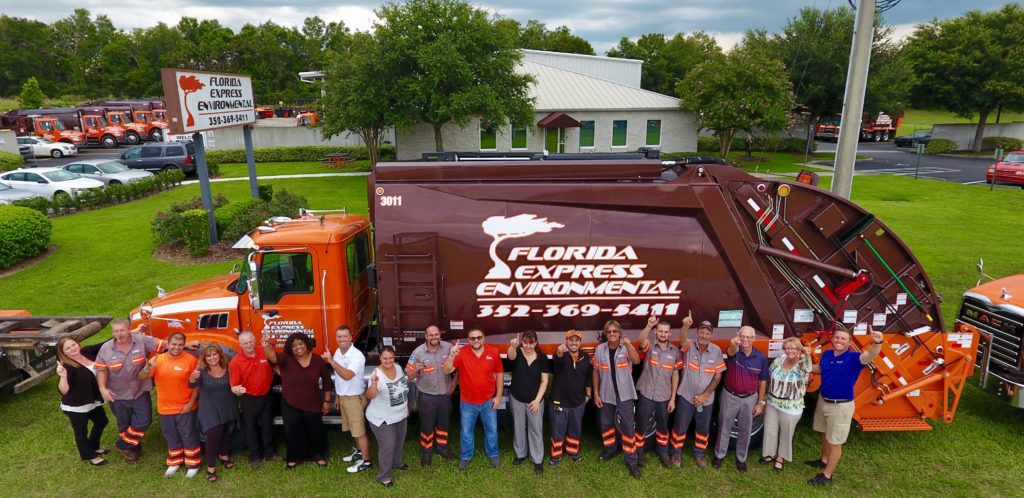News sites and social media are filled with stories of healthcare professionals working to help those sickened by, or who may be infected with, the Coronavirus, as well as those working in grocery stores and pharmacies to ensure people have access to food and medicine.
There also are other essential jobs out there that might not come immediately to mind as our nation, and the world, continues to battle COVID-19. Among those who are the truly essential, yet sometimes forgotten, are sanitation workers.

A check in with county and city authorities, and one private service provider, indicates that the ripple effect of the virus is being felt locally in the waste and recycling industries.
Among the contributing factors are stay-at-home orders, businesses and schools closed, and people suddenly finding time to clean out closets and garages.
The increase of waste and recyclables has led these organizations to assess the impacts on staffing and budgeting. In the case of the private provider, Florida Express Environmental, that company has shortened route lengths and increased wages.
The company, in business for more than 45 years, is run by the Paglia family, which has deep roots in Ocala. According to General Manager John Paglia III, Florida Express Environmental owns and operates a construction and demolition landfill, recycling processing facility, and the largest fleet of privately-owned environmental service trucks in Central Florida. He says owning a waste business in Florida requires having contingency plans for short staffing, heavy garbage days due to holidays, and hurricanes—but COVID-19 is different.
“None of those contingency plans by themselves can help us prepare for this type of pandemic,” he says, “but by grouping parts of these plans together, in addition to our self-requirement of maintaining excellent customer service and staying light on our feet, we take each day as it comes.”
Among the immediate changes made by the company is a daily germicidal disinfecting and deep cleaning of each route truck.
“This allows employees to not have to worry about the already safety-intensive job,” Paglia notes. “We added more staffing and rented more collection equipment to allow us to shorten routes and get them completed earlier so employees can return home to their families, who may have kids home from school and spouses who may be temporarily unemployed.”
He said the company increased monthly safety bonuses by 50% and is in the process of evaluating future bonuses to assist employees through the pandemic.
“We also order 75 to 100 boxed lunches on Fridays from Mojos Bar and Grill, which helps support that local business,” Paglia offers.
He notes that some customers have donated masks and other supplies because they love their “garbage guys.”
Residents in rural areas of Marion County, which is larger in size than the state of Rhode Island, can find 18 solid waste facilities throughout the county, which accept household waste and recyclables.
According to Marion County Solid Waste Director George White, in comparing quantities from March 2019 to March 2020, “we do find an increase of approximately 1,500 tons for all of the types of waste brought into our facilities. Approximately 800 tons of this increase is residential trash alone.”
White says onsite traffic at the county centers has been noticeably different.
“More residents are visiting our facilities during the week, as opposed to the weekends,” he notes.
County officials say the facilities will remain open and that visitors should maintain social distancing for the safety of others.
Another outcome of the increased activity has been an increase in litter, prompting the county officials to remind residents to “properly bag, secure and tarp on the way to our facilities to help us fight roadside litter.”
Authorities with the City of Ocala Public Works Department say they also have seen an increase in residential sanitation collection and yard waste, which typically is high this time of year because it is “heavy leaf season,” but also because more people are home due to COVID-19.
The city’s sanitation division provides collection service to more than 15,000 single family homes, 6,000 multi-family units and 3,000 commercial businesses. All solid waste, excluding construction and demolition debris and recyclables, is collected and disposed of by the city.
City officials say they are continuing to provide the “same services with no changes.”
They also want readers to know that May 17-23 is National Public Works Week, providing “a chance to acknowledge people who are part of our essential services.”






